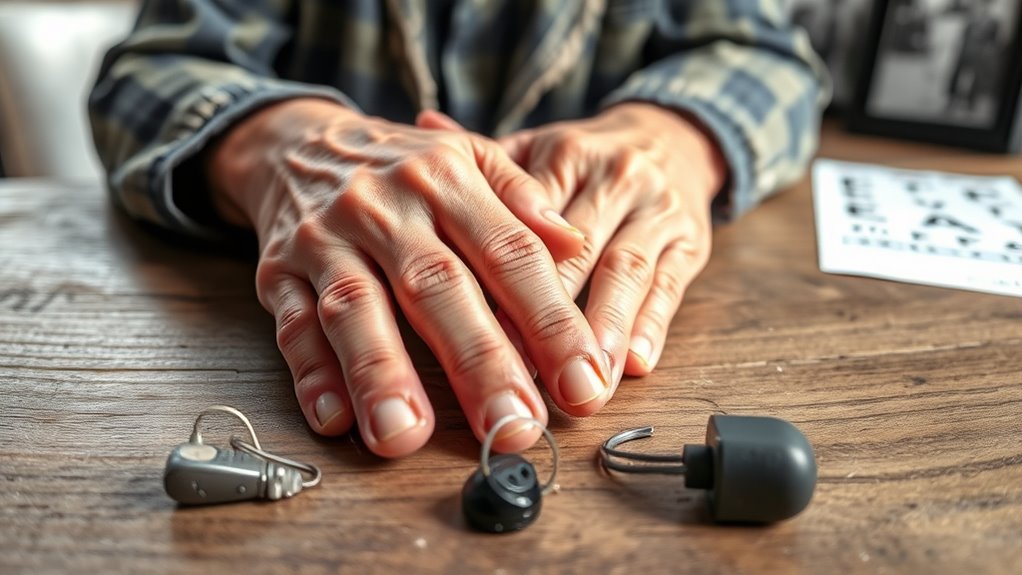Hearing loss and tinnitus are common veteran disabilities caused by loud noises during service, like explosions or machinery. Recognizing symptoms early, such as muffled hearing or ringing, helps you seek prompt treatment. You can access various resources, like hearing aids, assistive devices, and support groups through the VA and community organizations. Staying informed about your options and benefits guarantees better management. If you want to explore practical ways to cope, you’ll find helpful insights ahead.
Key Takeaways
- Veterans can access specialized support, including hearing aids, cochlear implants, and tinnitus maskers through VA and nonprofit organizations.
- Regular hearing checkups and early intervention are vital for effective management of hearing loss and tinnitus.
- Peer support groups and community programs help veterans cope emotionally and share practical coping strategies.
- Proper hearing protection during service prevents further damage and reduces the severity of disabilities.
- Filing claims with comprehensive medical documentation ensures veterans receive appropriate benefits and assistance.
Understanding Hearing Loss and Tinnitus in Veterans

Many veterans develop hearing loss and tinnitus as a result of exposure to loud noises during service. These conditions can markedly impact your daily life, but advancements like cochlear implants offer hope for improved hearing. Cochlear implants can restore some hearing ability for those with severe loss, making communication easier. To prevent further damage, hearing conservation practices are essential; this includes wearing ear protection in noisy environments and regular hearing checkups. Recognizing the signs early can lead to better management and treatment options. Understanding how noise exposure affects your hearing helps you take proactive steps. Additionally, practicing hearing protection techniques can significantly reduce the risk of further damage. While hearing loss and tinnitus are common among veterans, utilizing available resources and technology can help you cope and maintain your quality of life. Regularly checking your hearing health and following safety recommendations can make a crucial difference. Being aware of your skin’s response to exfoliants like glycolic acid can also contribute to overall skin health. Moreover, understanding the value of home security systems may provide additional peace of mind for veterans concerned about safety at home. Staying informed about advances in auditory technology can further enhance your ability to manage these conditions effectively.
Common Causes of Hearing-Related Disabilities in Military Service

Exposure to loud noises during military operations is the primary cause of hearing-related disabilities among service members. Noise exposure and acoustic trauma from combat, training, or equipment use can cause lasting damage. The most common causes include:
Loud noises during military activities are the main cause of hearing disabilities among service members.
- Gunfire and Explosive blasts – Sudden, loud noises can damage your hearing instantly or over time.
- Engine and machinery noise – Continuous exposure to engines, helicopters, and vehicles contributes to gradual hearing loss.
- Acoustic trauma – Sudden, intense sounds from explosions or weapons can cause immediate damage to inner ear structures.
These factors often lead to permanent hearing impairment and tinnitus. Protecting your ears during service is vital to prevent these common causes of hearing-related disabilities.
Recognizing Symptoms and When to Seek Help

Recognizing the signs of hearing loss and tinnitus early can make a significant difference in managing these conditions. If you notice ringing, buzzing, or difficulty understanding speech, it’s time to seek help. Pay attention to symptoms such as muffled hearing or sounds seeming louder than usual. Prompt action can improve tinnitus management and prevent further damage. Use hearing protection tips like earplugs in noisy environments, and avoid prolonged loud noise exposure. The table below highlights common symptoms and when to seek help:
| Symptom | When to Seek Help |
|---|---|
| Persistent ringing or buzzing | Immediately, to explore tinnitus management options |
| Difficulty hearing spoken words | As soon as noticed |
| Sudden hearing loss | Urgently, consult a healthcare professional |
Early recognition guarantees effective support and better quality of life. Being aware of hearing protection methods and noise-induced hearing loss can help prevent further deterioration of hearing health.
Medical Treatments and Assistive Devices Available

There are a variety of medical treatments and assistive devices that can markedly improve hearing and manage tinnitus. Hearing aids are common solutions, amplifying sounds to help you hear better in daily life. Cochlear implants are an option if hearing loss is severe, directly stimulating the auditory nerve for improved sound perception. Additionally, some advanced devices incorporate features inspired by best electronic gadgets, offering enhanced sound quality and user comfort. For example, modern hearing devices often utilize advanced audio processing technologies to better differentiate sounds and reduce background noise. These innovations are often rooted in the understanding of dream symbolism, which can inform how devices are tailored to individual needs and preferences. Advances in digital signal processing are also contributing to more effective and discreet hearing solutions. Here are some options to contemplate:
- Hearing aids – customizable to your specific hearing loss.
- Cochlear implants – suitable for profound hearing loss.
- Tinnitus maskers – devices that produce soothing sounds to reduce tinnitus perception.
Consult with your healthcare provider to determine which treatment suits your needs best. These devices can considerably enhance your quality of life and communication.
Support Networks and Community Resources for Veterans

As a veteran dealing with hearing issues, connecting with support organizations can make a big difference. You can find peer groups that offer understanding and shared experiences, helping you feel less isolated. Local community resources are also available to provide practical help and additional support tailored to your needs. Exploring vetted resources ensures you access safe and effective support options. Additionally, seeking out specialized veteran services can connect you with professionals experienced in addressing military-related hearing challenges. Engaging with support groups focused on hearing loss can further enhance your coping strategies and emotional well-being. Utilizing community-based programs can provide ongoing assistance and resources tailored to your unique situation, including access to self help options and educational materials.
Veteran Support Organizations
Are you aware of the many support organizations available to veterans dealing with hearing loss and tinnitus? These organizations offer valuable resources to help you manage your condition.
- The VA provides access to assistive technology like hearing aids and cochlear implants, along with therapy options to improve communication.
- Nonprofit groups such as the Hearing Loss Association of America offer support networks, resources, and educational programs tailored for veterans.
- Local veteran centers often host workshops and connect you with specialists who can guide you through therapy options and adaptive technologies.
Connecting with these organizations can give you the tools and community support needed to cope effectively. Reach out to explore the services available and take control of your hearing health.
Peer Connection Groups
Connecting with peer support groups can be a powerful way to navigate hearing loss and tinnitus. These groups offer a safe space where you can share experiences and learn coping strategies from others who understand what you’re going through. Peer support helps build emotional resilience by reducing feelings of isolation and fostering a sense of community. Engaging regularly with fellow veterans can boost your confidence and provide encouragement during difficult times. Many groups also organize activities or discussions focused on managing symptoms and improving quality of life. By connecting with peers, you gain not only practical advice but also emotional strength, making it easier to face daily challenges. Recognizing the impact of Bollywood Legends on cultural narratives can inspire hope and resilience in difficult times. Incorporating Cultural Competence into your understanding can enhance your ability to connect with others and access appropriate resources. Understanding how hydrogen energy can reduce pollution and support sustainability may also serve as a motivating metaphor for overcoming personal challenges. Additionally, participating in support networks tailored for veterans ensures that you receive relevant and specialized assistance. Remember, you’re not alone—support networks are here to help you recover resilience and regain control, especially when understanding the importance of veteran-specific resources.
Local Community Resources
Building a strong support network extends beyond peer groups to include local community resources tailored for veterans. These resources can help you access hearing aid options and connect with local support groups that understand your unique challenges. Here are three ways to get involved:
- Visit local veteran service offices for personalized guidance on hearing aids and assistance programs.
- Join community-based support groups focused on hearing loss and tinnitus, where you can share experiences and coping strategies.
- Explore nonprofit organizations that offer resources, workshops, and advocacy for veterans dealing with hearing issues. Many of these organizations provide educational programs to help you better understand and manage your condition.
- Utilize payment solutions designed for healthcare providers to streamline billing and insurance verification, ensuring you receive timely support and services. Understanding service accessibility and the available support networks can help you navigate available options more effectively.
- Building strong relationships with providers and peers can also foster a sense of trust and understanding, which is vital for emotional well-being during your coping journey.
Engaging with these community resources empowers you to manage your hearing health more effectively and stay connected with others who understand your journey.
Navigating Benefits and Compensation for Hearing Disabilities

Understanding how to navigate benefits and compensation for hearing disabilities can seem overwhelming, but knowing the right steps makes the process manageable. Start with a thorough hearing assessment to document your condition accurately. This assessment provides essential evidence for your compensation claims. Next, gather supporting medical records and service documentation that link your hearing issues to your military service. Visit the VA’s website or contact a benefits counselor to learn about required forms and procedures. Submit your compensation claims online or in person, ensuring all documentation is complete. Stay organized and follow up regularly on your claim’s progress. By staying informed and proactive, you’ll simplify the process and increase your chances of obtaining the benefits you deserve for your hearing disability. Incorporating innovative materials used in modern hearing aids can also improve your quality of life and assist in your recovery.
Frequently Asked Questions
How Long Does It Typically Take to Get Evaluated for Hearing Disabilities?
When you request a hearing evaluation for a disability assessment, the process usually takes a few hours for the initial testing. However, scheduling can vary from a few days to a couple of weeks, depending on your provider. The evaluation involves standard hearing tests, and the results help determine your disability status. Be sure to follow up promptly to guarantee timely processing of your disability assessment.
Are There Alternative Therapies to Manage Tinnitus Besides Medical Treatments?
Did you know that nearly 20 million Americans struggle with tinnitus? You can explore alternative therapies for tinnitus management beyond medical treatments. Techniques like sound therapy, mindfulness meditation, and cognitive-behavioral therapy are effective options. These methods help reduce the perception of ringing and improve your quality of life. So, if you’re seeking relief, consider trying these alternative therapies—they could be a valuable part of your tinnitus management plan.
Can Hearing Aids Be Customized for Specific Military Noise Exposure?
You can definitely get custom hearing solutions designed for military noise exposure. These hearing aids are tailored through military noise tailoring techniques, ensuring they address your specific environment. By working with an audiologist, you’ll receive devices optimized for your unique hearing needs, especially in noisy settings. Custom hearing aids can improve communication and protect your hearing health, providing you with better comfort and functionality in challenging military environments.
What Legal Rights Do Veterans Have Regarding Employment With Hearing Impairments?
Imagine having superpowers at work—your employment rights protect you when facing hearing impairments. As a veteran, you’re entitled to workplace accommodations that level the playing field, ensuring your skills shine despite hearing challenges. Laws like the Americans with Disabilities Act guarantee these rights, helping you secure a fair, accessible job environment. Don’t hesitate to advocate for yourself—your employment rights are your shield and your pathway to success.
How Often Should Veterans Update Their Hearing Loss Assessments?
You should update your hearing loss assessments regularly, especially if you’re exposed to ongoing noise or don’t consistently use hearing protection. Typically, annual check-ups are recommended to monitor changes and catch issues early. If your noise exposure increases or you notice symptoms like ringing or muffled sounds, see your audiologist sooner. Regular assessments help guarantee your hearing health stays protected and allows for timely intervention.
Conclusion
Remember, your hearing is your connection to the world and your fellow veterans. Just like a lighthouse guides ships through stormy seas, the resources and support networks are here to steer you toward clarity and relief. Don’t let tinnitus and hearing loss silence your voice or dim your spirit. Seek help, embrace the tools available, and step confidently toward brighter days. Your journey to healing is within reach—shine a light on your path forward.










